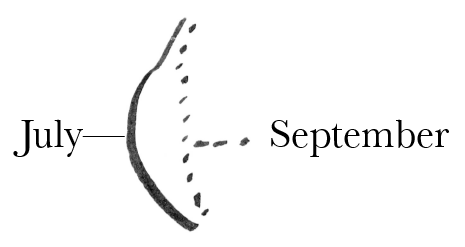From T. H. Huxley 28 September 1871
Castlemount, St. Andrews
Sep. 28. 1871
My dear Darwin
I send herewith a duplicate proof of my article in which I have corrected all the most important printer errors—for your private delectation1 But if you like you can send it on to dear old Hooker when you have read it—2 I have told him what I am about and I know he will chuckle on the slaughter of the Amalekite.3
Knowles (Editor of Contemporary) thinks so much more of the article than I do, that he is going to reserve it for his November number because he says people will have come back to town & he will have had time to ‘blow the trumpet’—4 I am not much given to this sort of thing myself but under the circumstances it is perhaps as well, that people should be made to understand that the gallant Mivart is not going to have it all his own way—5
I am really grieved to find that you have no doubt that the authorship of the Quarterly article, must be attributed to him—6 The internal evidence of the fact seemed to me very strong—and yet I hoped there might be some escape from the conclusion— In it shews that he is one of those people who will write anonymously what they dare not put their names to. The fact that Mivart is the author of the Quarterly article quite removes some compunction I had before about shewing up his nonsense about Suarez.7
I am very glad you are going to take up his objections in detail, as I have kept pretty clear of that part of the matter believing it better policy to strike hard about those questions which men devoid of special scientific learning can deal with.8
My article is confoundedly long as it is—
Great as you say is the power of misrepresentation.9 But one use of the study of the history of science & of philosophy, is the true faith it brings that the power of misrepresentation great as it is, is of no permanent importance— I brought Jowett’s Plato with me and have been studying the ‘Republic’ in his charming translation10
In the course of the last two thousand years I suppose that some millions of human jackasses have brayed & kicked up their heels at Plato’s ideal— And yet there it is alive & fresh and as helpful & delightful to me as it was to old Thomas More— Now I venture to prophesy that whatever clouds of dust the ‘powers of Doom’ (who is stupidity) may raise about the ‘Origin of Species’—it will remain fresh & helpful to all true students; and two thousand years hence—when my name is known only because it occurs in the ‘origin’ and learned scholars have decided that ‘Darwin’ was not a real person, but the assumed name of a society of distinguished naturalists who, being afraid of the Church, wrote under a pseudonym which is an obvious play upon the old English word ‘Daring’—earnest students will be drawing new ideas from your inspiration—and consoling themselves with the reflection that after all, Truth doesn’t die. ‘Gaudeamus igitur, senes dum sumus’ as the old Bursch-song doesn’t say—11
The wife sends best love to all Harry is all right again and he & the rest are tearing about like mad—because everything is packed up & we start for home tomorrow.12 I never saw such little beggars for enjoying themselves
My wife says golf has greatly improved me & diminished my anterior curvature

Ever Yours faithfully | T. H. Huxley
Footnotes
Bibliography
Descent: The descent of man, and selection in relation to sex. By Charles Darwin. 2 vols. London: John Murray. 1871.
Origin 6th ed.: The origin of species by means of natural selection, or the preservation of favoured races in the struggle for life. 6th edition, with additions and corrections. By Charles Darwin. London: John Murray. 1872.
Summary
Sends proof of article for Contemporary Review [18 (1871): 443–76].
Is grieved to hear that Mivart is author of Quarterly Review article. THH thought better of him than that.
Compares the Origin to Plato’s Republic: "it will remain fresh for two thousand years".
Letter details
- Letter no.
- DCP-LETT-7973
- From
- Thomas Henry Huxley
- To
- Charles Robert Darwin
- Sent from
- St Andrews
- Source of text
- DAR 99: 43–46
- Physical description
- ALS 8pp
Please cite as
Darwin Correspondence Project, “Letter no. 7973,” accessed on 20 April 2024, https://www.darwinproject.ac.uk/letter/?docId=letters/DCP-LETT-7973.xml
Also published in The Correspondence of Charles Darwin, vol. 19


